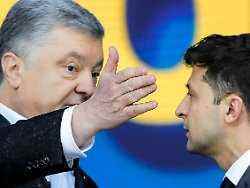politics in times of war
Poroshenko teases against Zelenskyj
By Denis Trubetskoy, Kyiv
06/15/2022, 5:31 p.m
For Ukrainian politics, the main concern at the moment is to fend off the Russian invasion. Nevertheless, even in these times, domestic political life goes on – as the eternal conflict between President Volodymyr Zelenskyy and his predecessor Petro Poroshenko shows.
Even before the major Russian invasion on February 24, Ukrainian domestic politics was turbulent. However, under much more normal circumstances: After Volodymyr Zelenskyj had beaten his predecessor Petro Poroshenko for the presidency in the spring of 2019 with 73 percent in the runoff election, the ex-actor still came first in the polls before the war. However, his popularity ratings were only around 25 percent – no trace of the former enthusiasm.
That had to do with two conflicts simmering in the background. On the one hand, the eternal rivalry with Petro Poroshenko, Zelenskyj’s archrival. On the other hand, Zelenskyj quarreled with the richest
Ukraine’s man, Rinat Akhmetov, whose media empire was initially quite friendly about the president. However, after Zelenskyy advocated the so-called policy of de-oligarchization and made unfavorable decisions for Akhmetov’s energy company, he was sharply criticized by his media towards the end of 2021. Zelenskyy was offended and even accused those close to Akhmetov of planning a coup with the Russians to journalists.
But since February 24, everything has changed in Ukrainian politics. For one thing, a number of pro-Russian parties were banned for the duration of the war. This particularly affected the Opposition Platform party, which came second in the last parliamentary elections and whose representatives often collaborated with the Russians in occupied territories. The part of the party linked to close Putin ally Viktor Medvedchuk has de facto left. The other part, mainly oriented towards economic affairs, founded a new group of deputies in Parliament. On the other hand, Zelenskyj and Akhmetov settled their dispute. The Akhmetov broadcasters are prominent participants in the state TV marathon “Common News,” and the oligarch himself is one of the largest donors to the Ukrainian army.
Dispute with Poroshenko continues to smolder
The roles of Zelenskyj and those around him have also changed. The president is almost completely absent from domestic politics, concentrating entirely on the areas prescribed for his office by the Ukrainian constitution – foreign policy and defense. As the well-known Internet newspaper “Ukrajinska Pravda” reports, employees of his former production company Kwartal 95, who were among his most important allies at the beginning of his term in office, have hardly any influence on him anymore. Among other things, it is about the head of the domestic secret service SBU, Ivan Bakanov, who has been close friends with Zelenskyj since childhood. His replacement has been in the air for a long time.
What is still going on in the background, despite all the changes, is the conflict between Zelenskyj and Poroshenko. Times are tough for the latter: While he was in office, he helped make the Ukrainian army significantly more powerful than it was before 2014. But due to the large-scale Russian attack, he doesn’t have a good hand to openly attack Zelenskyy. That’s why it’s mostly the members of parliament from his European Solidarity party and his news channel Prjamyj (“Direkt”) and Kanal 5. They didn’t join the unified news marathon either, although this has been a legal requirement for some time. As a result, they were removed from digital reception and are said to have lost between 10 and 20 percent of their viewers as a result.
Officially, the broadcasters were dissatisfied with the time slots offered, but in fact none of the sides wanted to take part – Poroshenko’s broadcasters would then most likely have had to refrain from cautious criticism of Zelenskyj. These criticisms include that Zelenskyi’s team did not take Western warnings of the Russian invasion seriously enough and that the president paid less attention than necessary to the issue of army funding. There is also speculation as to how the Russian army was able to march so quickly through southern Ukraine and take the city of Cherson. The achievements of the Ukrainian army, on the other hand, are attributed to Poroshenko’s tenure, prompting a series of derisive memes on the internet.
Allegations against ex-president
However, it is not only Poroshenko’s environment that fuels the conflict in the background, but also that of Zelenskyj. When the ex-president wanted to attend the party conference of the European People’s Party in Rotterdam and the NATO Parliamentary Assembly in Brussels at the end of May, he was only allowed to leave the country on the third attempt. Allegedly, the border police could not scan the QR code in Poroshenko’s exit permit. However, there could also be ongoing criminal proceedings against the fifth President of Ukraine. Poroshenko is accused of having been involved with the pro-Russian politician Medvedchuk in approving an oil pipeline and in illegal coal trade with the so-called separatist republics in Donbass. Medvedchuk was under house arrest before February 24, disappeared under unclear circumstances, was arrested again and then incriminated Poroshenko.
Either way, Poroshenko should have returned from his business trip on June 2nd. According to research by Ukrainian journalists, however, he was in London for a while, which was not actually on his route. It was only after several days that he was sighted in Lviv. Although Ukraine has other concerns at the moment, the conflict between Zelenskyy and Poroshenko also clearly shows that the country’s domestic political life goes on even during the Russian war. At the same time, Selenskyj seems to be undisputed in Ukraine at the moment: According to polls, it may not be 91 percent who supported him immediately after February 24, but his popularity has not fallen much since then.
